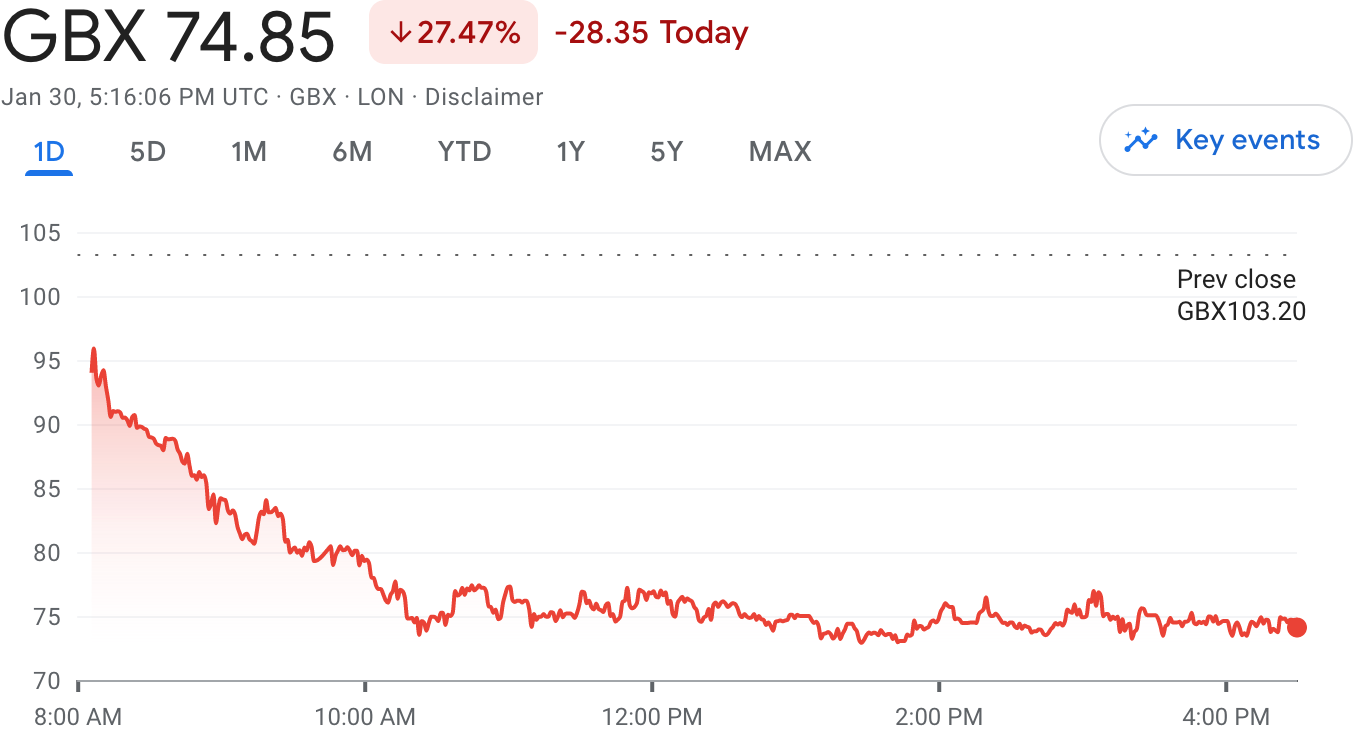Gibraltar in the frame for 888 VIP shambles
Regulator roles in spotlight after 888 admission, US legislative rethinks, Canada’s ad aversion, Scully prompts UK optimism +More
Good morning. On today’s agenda:
Gibraltar has emerged as the jurisdiction at the center of the 888 VIP AML failures.
A legislative do-over of US gambling laws used to be a very rare event – not so much now.
Nearly half of Canadians think gambling ads are becoming excessive.
Comments from the UK gambling minister spark rare regulatory optimism.
Casino staff will be subject to incoming UK economic crime laws.
Sometimes it's hard when we're both caught off guard.
Gibraltar central to 888 VIP issues
The AML and KYC failures admitted to by 888 yesterday, which led to the resignation of the company’s CEO, took place under 888’s Gibraltar license.
Don’t stop the rock: The Gibraltar Gambling Commission said that it has previously been notified of the AML and KYC failures that were brought to light by the company yesterday. In a statement, the GGC said it would be “reviewing and discussing the outcome of the internal investigation in due course”.
The GGC statement added that “relevant customer accounts have been suspended” while that internal investigation is carried out and 888 has “given full commitment to regulatory transparency in respect of this matter”.
“It is too early to say what the regulatory outcome will be, but on the known facts, and because of the level of commitment to resolution, license suspension or revocation, is highly unlikely.”
For hummus the bell tolls: Sources suggested the issue with the Middle Eastern VIP accounts emerged in December last year after an internal investigation of the compliance processes relating to 888’s pre-merger operations in Gibraltar.
They noted that this comes at a time when Gibraltar is under added scrutiny with regard to the Financial Action Task Force (FATF) after having been added to its gray list over its AML procedures in June last year.
Watching brief: Meanwhile, the UK Gambling Commission could prove central to what happens next. Before the two businesses merged, 888 was fined £9.4m in March last year while William Hill as an entity is still under a license review and is awaiting news on the quantum of its regulatory sanction for what is believed to be historic failures within its UK retail business.
The pre-merger William Hill said in April last year that it had set aside £15m to cover the cost of the settlement.
Sources pointed out that, in light of the new circumstances, that settlement might be the subject of a rethink on the part of the Commission.
A statement from the UKGC repeated its usual line that it could “neither confirm nor deny” whether there are ongoing enquiries.
Gray background: Dotcom businesses have “long serviced VIPs”, said the team at Regulus, and many of these VIPs will come from countries where online gambling is not regulated “or even legal”. Hence the Middle East element of 888’s VIP customer base.
Much of this activity predated operators being held to account on AML compliance.
“It therefore became commercially risky to internally regulate and therefore probably diminish this revenue stream,” Regulus added.
By definition, gray market activity is inherently “more dangerous” from a regulatory perspective.
“The Middle East contains a full house of ample VIPs, complex gambling law, extreme AML risk and ‘creative’ payment processing, to the extent that the act of doing business is potentially as big a problem as the amount from a legal risk standpoint.”
⚠️ 888’s share price takes a tumble yesterday
** SPONSOR’S MESSAGE ** Tried, tested and proven over a decade in the highly-regulated US market, and continuing to expand across Europe, Latin America, Asia and Africa. GeoComply harnesses the power of its market-leading geolocation technology to protect against fraud, including fake account creations, bonus abuse, account takeovers, stolen identities, money laundering, and more. Visit geocomply.com.
US regulation rethinks
A do-over of US gambling laws used to be a very rare event, but now lawmakers appear much keener on relitigating existing legislation.
Altered beast: Reopening gambling laws has always been anathema to US lawmakers, something done only in extraordinary circumstances. At least it used to be. One of the most significant changes in the post-PASPA world is a newfound willingness to crack open existing and even recently passed laws. And with the rush to legalize sports betting, buyer’s remorse is rearing its head in some locales.
Virginia and Colorado have made changes that reduce promotional deduction allowances over time.
New York is considering adjusting its highest-in-the-nation tax rate (tied with New Hampshire at 51%).
Tweak now or forever hold your peace: On a more macro scale, New York is considering several other policy tweaks that further highlight the readiness to alter recently enacted laws:
A Senate bill (S 1550) would require “all advertisements for gambling and sports betting to include warnings about potential harmful and addictive effects of gambling”.
In the Assembly, A 1056 would create a problem gambling advisory council.
There is also an effort afoot in New York to earmark 3% of tax revenue collected for problem gambling support.
Lawmakers used to trust that legislation they sponsored or supported would remain unchanged, at least long enough that they would no longer be held accountable for it.
Overstepping mandates
And then there is the situation in Massachusetts, where the Gaming Commission voted 3-2 that it had the power to decide if operators can deduct promotional credits from taxes. The MGC didn’t exercise that power, choosing not to allow promotional deductions in a subsequent vote.
I’ve got the power: But the power remains, leaving the door open for a future, differently constituted MGC to vote to enable promotional deductions.
That could lead operators to try to put their thumb on the scale (via lobbying or campaign contributions) and push for sympathetic-to-them commissioners when an opening is available.
Five will make you feel alright: The five MGC Commissioners are appointed one each by the Governor, the Attorney General, the treasurer and receiver-general and then two more by a majority vote of the above.
It hasn’t presented itself to date, but this lack of permanency could dissuade lawmakers from sponsoring or supporting gaming expansions.
A cornucopia in New York
A lot on their plate: New York lawmakers will be bombarded with gambling issues in 2023. In addition to adjusting the tax rate and designating 3% of tax revenue to problem gambling, the legislature will deal with the following:
The legalization of online casino gambling. Sen. Joseph Addabbo intends to reintroduce an online casino bill this year. He is waiting to see if Gov. Kathy Hochul includes it in her budget, per Gambling.com.
Downtown: The political wrangling and inevitable fallout of the three downstate casino licenses the state has made available.
Tackling multiple gambling issues on the heels of a recently launched sports-betting industry doesn’t bode well for online casinos. Lawmakers may come down with a case of gambling fatigue.
Canada ad annoyance
Nearly half of Canadians think gambling ads are becoming excessive, according to a new Ipsos Mori poll that has set tongues wagging in the land of the maple leaf.
Eight months after the Ontario government launched a regulated online gambling market, more Canadians than ever are placing online wagers, pollsters found, but the ubiquity of ads is causing concern.
Ipsos found that 48% of Canadians think the amount and volume of advertising is excessive and should be cut back.
There should be limits on the amount and/or placement of advertising, said 63%.
The numbers are similar across the country, even in provinces without regulated online gambling markets.
You oughta know: While the mainstream press ran with fairly damning lines, industry reaction was more muted, with many noting that, while almost all ads are annoying, operators should tread carefully.
Regulus said the findings “should act as a warning to participants in Canada’s nascent online market (and possibly for operators south of the border too)”.
Gaming News Canada’s Steve McAllister told C+M the numbers had caused a flap, but with little focus on how well the media does from the huge sums spent by advertisers.
“People around the industry here agree, however, that if the operators and media networks don’t get their act together the regulators will take action of their own,” McAllister said.
Minister sparks optimism
The UK gambling minister Paul Scully’s comments at the Betting and Gaming Council AGM suggest the worst fears over the upcoming White Paper might not come to pass.
Give ’em what they want: Perhaps aware of the audience he was speaking to, Scully struck a mollifying tone at the event last week. In particular, his attempt to reframe the debate about affordability around the term ‘financial risk’ was welcomed by industry commentators.
Scully told the audience that “affordability checks is the wrong title for the protections we’re envisaging”.
“It may be more accurate to call them ‘financial risk’ checks – checking that a higher than usual level of spend is not itself an indicator of harm,” he added.
Scully mania: “I thought the minister's speech indicated a triumph of common sense,” said Dan Waugh from Regulus. Affordability, he noted, is a subjective term and its use in policy debates has “created considerable confusion”. Gemma Boore, senior associate at Harris Hagan, said that, while there is no certainty of Scully’s tone being reflective of the White Paper, it was an “encouraging message”.
Scully “appears to recognise” that financial thresholds are not the “end of the story” and that other factors need to be taken into account as indicators that a consumer is experiencing gambling harm.
“Provided this vision comes across in the White Paper when it is published, it will be difficult for the Gambling Commission to proceed with prescriptive affordability checks as standard,” Boore added.
Waugh said the situation was now “finely poised”.
“It remains to be seen whether the market regulator changes course to align with the Government's position; or persists through informal coercion in its attempt to control how adults may spend their own money.”
Greasing the wheels: Charles Cohen at solutions provider Department of Trust pointed out that terminology alone won’t ensure any new rules work. “The new rules must give detail to operators and players for this to work,” he suggested, adding that frictionless checks for financial risk “don’t exist”.
“At some point, people are going to have to share data, most likely from bank accounts,” he said.
“If the process is to be less intrusive and smooth, licensees must be able to use data derived from Open Banking and other approaches that can make it easy for customers.”
UK crime bill implications
Casino staff will be subject to incoming UK economic crime laws that criminalize failures to prevent fraud and money laundering, whether deliberate or unintentional.
Bad behavior: The Economic Crime and Corporate Transparency Bill 2022 is to include ‘failure to prevent’ conduct offenses prior to its forthcoming debate in the Lords, lawmakers said. The offenses are likely to be based on similar clauses for bribery and tax evasion, said Howard Rawstron, Lloyds Banking Group’s head of economic crime prevention.
They introduce direct criminal liability for managers who take a decision, “or fail to take a decision”, that knowingly results in an offense being committed.
Rawstron told C+M that casino operators should keep an eye on updates as “it’s money laundering that tends to be more of the focus when banking the gambling sector”.
All change: “The new law will be likely to see the biggest change in corporate criminal enforcement since the enactment of the Bribery Act in 2010,” said Jeremy Summers, Osborne Clarke partner and business crime expert.
Operators “will want to get well ahead of the curve” in having robust policies and procedures in place to ensure that they do not fall foul of this law, he said.
“The alternative could involve conviction, significant financial penalties and potentially terminal reputational damage,” Summers said.
The new laws would also “remove loopholes that effectively allow [businesses] to distance themselves from breaches they clearly knew about or should have prevented,” added Luke Firmin, partner and financial crime specialist at consultancy Valcon.
It’s not enough: Experts want legislators to expand on the liabilities when the bill reappears, given the broad range of offenses that could fall within the fraud, false accounting and money laundering umbrellas.
“A key question would be whom the fraud is meant to benefit (along with who does it),” said Nick van Benschoten, UK Finance director, as existing ‘failure to prevent’ offenses define it in different ways.
Bribery has to be intended to benefit the firm itself, while facilitation of tax evasion can be intended to aid either the business or one of its customers.
** SPONSOR’S MESSAGE ** Your customers think your payment options suck. And you pay too much for them! Process payments with BTC, ETH & Stablecoins instead - fast, reliable and inexpensive. And never any chargebacks! Get set-up @ ICE by meeting CoinSmart - licenced and regulated in Canada by the Ontario Securities Commission, and in Europe. Your customers (and your CFO) will thank you.
Book a meeting or drop us an email at smartpay@coinsmart.com.
Dirty cash
While the amount of dirty money reports filed by the UK’s gambling industry continues to rise, the crypto sector is putting up serious numbers.
Ring the alarm: Suspicious activity reports (SARs) by bookies and casinos were up 3.6% for the year to March 2022, a second consecutive leap following a sharp 19% jump from April 2020 to March 2021. Bookies also made 1,001 defense against money laundering reports (DAMLs) in 2021-22, up from 981 the previous year.
Casinos filed 1,401 DAMLs, another rise on the previous year’s total (1,264).
DAMLs are filed by businesses seeking to complete an action such as moving funds that they suspect could eventually be linked to a crime.
Previously called ‘consent orders’, the gambling sector noticeably bucked the overall DAMLs swing (a 21% drop) with rises from both bookmakers and casinos (land-based and online).
“This is a trend that is likely to continue to grow in 2023 as regulatory pressure increases, including the threat of enforcement action against individual compliance officers,” said Jessica Parker, specialist investigation expert at Corker Binning.
The new kid in town: SARs are up 21% overall on last year (901,255 in total), and the National Crime Agency (NCA) said crypto is powering the rise. More than 65,000 cryptocurrency SARs have been filed since September 2021, with at least 350 reports a day being lodged.
Crypto’s figures dwarf the gambling sector’s annual reporting numbers by tenfold.
Post-pandemic fraudsters and sanctioned entities linked to Russia’s invasion of Ukraine are still trying to move and obscure funds, NCA officials said.
Sports integrity notebook
Ontario has reinstated betting on UFC events following the deal struck between the sport and monitoring company U.S. Integrity.
Personnel notebook
SG:certified, the sustainability and safer gambling consultancy group has announced that Maris Catania has taken on the role of safer gambling senior consultant.
European notebook
A lottery win: The Swedish Press and Broadcasting Authority has agreed with a complaint from the Swedish Trade Association for Online Gambling that lottery draws on TV do constitute advertising for lottery operator Svenska Spel.
The Dutch regulator has fined licensee JOI Gaming, part of JVH Gaming & Entertainment, €400,000 after being found guilty of targeting adverts at young adults.
From Earnings+More
Ontario rises: The Ontario market has achieved 90% channelization as quarterly GGR soars.
What we’re reading
Charles Cohen from DoTrust on the need for gambling to take a proactive approach to avoid the pitfalls of the cost-of-living crisis.
The honest broker: Why did the Beatles get so many bad reviews?
Calendar
Feb 6-7: World Regulatory briefing at ICE
An +More Media publication.
For sponsorship inquiries email scott@andmore.media.











